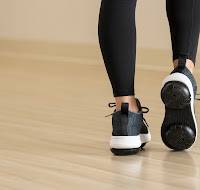Trained NHS professionals could offer Apos footwear to people with osteoarthritis: NICE consultation
Physiotherapists who have been trained to equip patients with severe osteoarthritis with specially designed shoes could see their workloads increase in the future.
The National Institute for Health and Care Excellence (NICE) launched a consultation on draft medical technologies today (15 November) that calls for Apos footwear to be made available to specific groups of people: those whose non-surgical standard care has not worked well enough and who meet the referral criteria for total knee replacement surgery, but cannot have, or do not want, surgery. The deadline for responding to the consultation exercise is 12 December.
Members of NICE's independent medical technology advisory committee found that Apos shoes could potentially save the NHS £1,958 per person when compared with standard care over five years. The estimated cost of a trained professional providing the footwear and associated treatment is £875 per person.
Apos footwear looks like a trainer and was developed by AposHealth. The aim is to improve the person’s biomechanics by redistributing pressure away from affected areas, thus reducing knee pain.
Rubber pods fitted on Apos shoes – fitted by physiotherapists and other trained professionals – help to re-educate the person’s muscles and correct abnormal walking patterns.
This recommendation will not only save the NHS money by balancing the best care with value for money, but it will also put a new innovation into the hands of health and care professionals to enable best practice [Mark Chapman, NICE]
Mark Chapman, NICE’s interim director of Medical Technology, said: ‘People with osteoarthritis of the knee can be in considerable pain going about their day-to-day lives and the evidence seen by our committee suggests this can be improved by wearing these shoes.
‘This recommendation will not only save the NHS money by balancing the best care with value for money, but it will also put a new innovation into the hands of health and care professionals to enable best practice.’
Clinical evidence from a high-quality randomised control trial shows that the Apos shoes improves scores for measuring pain, stiffness and function when compared with a sham device, NICE said in a media release.
Further data needed
The committee called for further data to be collected, however, on quality of life, health resource use and long-term surgical outcomes for people with knee osteoarthritis who meet the criteria for total knee replacement surgery, but who cannot have or do not want total knee replacement surgery and are using the Apos in the NHS.
At present, people with osteoarthritis of the knees can be offered aids (such as walking sticks) alongside NICE-recommended therapeutic exercise (local muscle strengthening, general aerobic fitness) and weight loss (if appropriate) as non-pharmacological management standard care.
Osteoarthritis is the most common type of arthritis in the UK and a condition that causes joints to become painful and stiff. It is estimated that one in five people aged over 45 have knee osteoarthritis in England, with 38,983 knee procedures taking place in England in 2021 according to the National Joint Registry.
NICE medical technologies guidance helps people in the NHS make efficient, cost-effective and consistent decisions about adopting new medical technologies. As it does not include a funding mandate, it is up to local commissioners to decide whether to implement any recommendations.
To find out more, visit: https://www.nice.org.uk/guidance/indevelopment/gid-mt570/consultation/html-content
AposHealth: reduces costs [a summary]
AposHealth states that its approach 'significantly reduces direct and indirect costs associated with knee/hip surgery and persistent pain treatment, while effectively managing waiting lists for this population'.
- most (93 per cent) of AposHealth patients did not progress to knee surgery within the first year of treatment
- AposHealth patients reduced their use of over-the-counter pain medication usage by 58 nper cent and there was a 16 per cent fall in opioid usage due to improvements in pain
- allows clinical commissioning groups (CCGs) to reinvest the costs saved from standard musculoskeletal treatment into other areas
- helps CCGs to manage patient waiting lists for surgery, providing capacity based on clinical need
- Source: https://www.aposhealth.co.uk/nhs
Share it with















